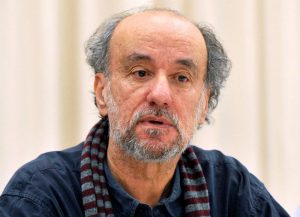Goran Stefanovski

Goran Stefanovski (27 April 1952 – 27 November 2018) was a leading Macedonian dramatist, screenwriter, essayist, lecturer and public intellectual. He died on 27 November 2018 in the UK.Stefanovski was a truly international figure, whose work deals with issues of migration, post-communist transition and identity, as well as what it means to be human.
Having fallen in love with all things English during his teenage years through the influence of the Beatles and Rolling Stones, Goran went on to study English Language and Literature at the University of Skopje. However, he couldn’t get the theatre out of his system and spent his third year of studies at the Faculty of Dramatic Arts (FDU) in Belgrade. He graduated as the best student of his generation in Skopje and took a job in the Drama Department of Skopje TV, although he was soon to return to the University to teach English Literature, with a particular focus on Shakespeare.
A radio play about Shakespeare, two TV plays with a contemporary setting and a six-part TV series set in the 1940s followed Goran Stefanovski’s early success in the second half of the 70s. In 1979 he wrote his best-known play, Wild Flesh (Диво месо), which has had fifteen productions to date all over Europe, including London, and is on the secondary school curriculum in his homeland. The play is based on the experiences of his father and uncles during World War II. It brought him the October Prize of the Republic of Macedonia for exceptional artistic achievement, the highest award of the Republic, as well as the 1980 Award for Best Yugoslav Play of the Year at the Yugoslav National Theatre Festival.
Almost every year for the next thirty-three years was to see a new and successful play by Goran Stefanovski, many of them award-winners. In the 1980s he continually pushed the boundaries of Yugoslav theatre, both in an artistic and political sense. The False Bottom (1983) (Дупло дно) was particularly bold in its challenge to state censors. In 1988 The Black Hole (Црна дупка) received its first productions; with its unique structure and stunning theatricality, it is generally considered to be his greatest contribution to European theatre.
A highly regarded essayist, public intellectual and lecturer, Stefanovski contributed papers to a large number of conferences and held workshops all over Europe. His last public lecture was as keynote speaker at the International Federation for Theatre Research World Congress in Belgrade in July 2018. His last public appearance was to receive an honorary doctorate from the Bulgarian National Academy for Theatre and Film Arts in Sofia.
Goran Stefanovski died of an inoperable brain tumour in 2018 at the age of 66. His death brought scores of tributes to his brilliance as a writer and teacher, as well as outpourings of admiration and love for him as a human being of great wisdom, modesty and kindness.

